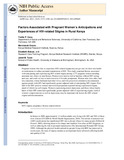| dc.description.abstract | Pregnant women who fear or experience HIV-related stigma may not get care for their own health or medications to reduce perinatal transmission of HIV. This study examined factors associated with anticipating and experiencing HIV-related stigma among 1777 pregnant women attending antenatal care clinics in rural Kenya. Women were interviewed at baseline, offered HIV testing and care, and a sub-set was re-interviewed at 4-8 weeks postpartum. Women who were older, had less education, whose husbands had other wives, and who perceived community discrimination against people with HIV had significantly greater adjusted odds of anticipating HIV stigma. Over half of the HIV-positive women interviewed postpartum reported having experienced stigma, much of which was self-stigma. Women experiencing minor depression, and those whose family knew of their HIV status had significantly greater adjusted odds of experiencing stigma. Lack of women's empowerment, as well as depression, may be important risk factors for HIV-related stigma and discrimination. | en |

